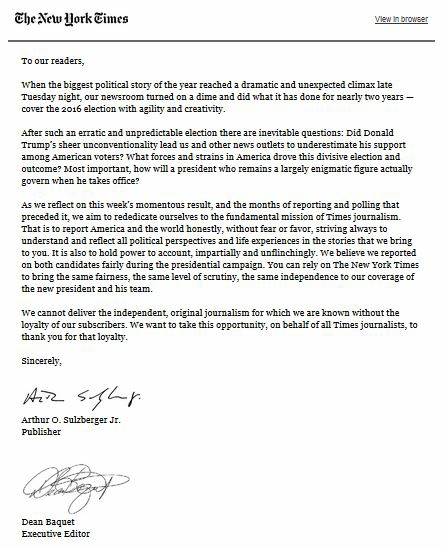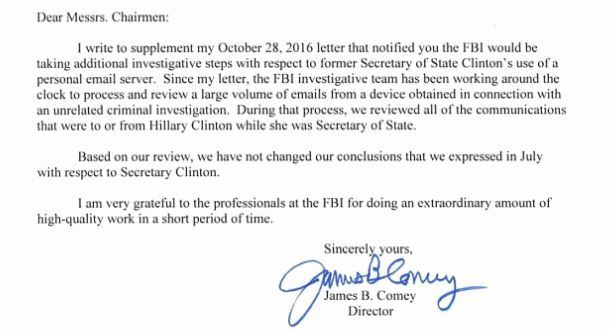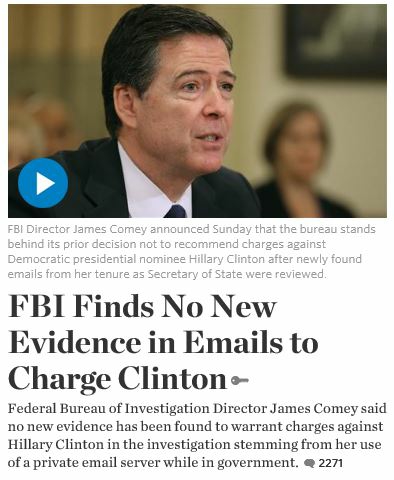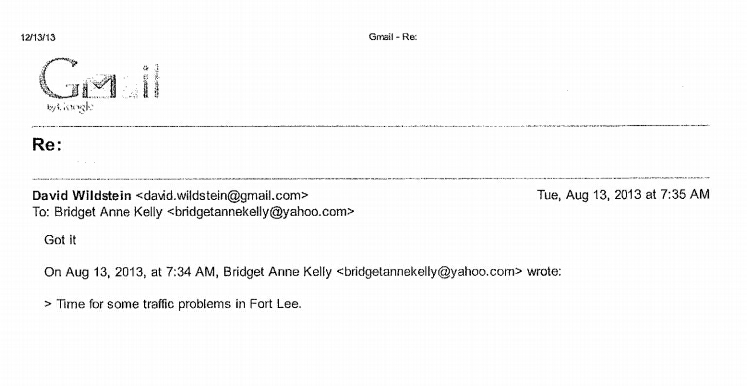Communications About Train Derailment in India
More than 140 people died, and dozens more were injured when a train derailed in Uttar Pradesh State, India. Although the cause isn't yet determined, one theory is a crack in the rail, which may be one of dozens on the country's tracks.
Railway Minister Suresh Prabhu visited the site and said, "Right now the immediate priority is rescue people and to bring relief to those injured and that's what we are doing." He later gave a statement to a reactive audience.
According to a CNN report, the train system employs 1.3 million people and serves 23 million passengers every day. The rail system has been criticized for poor maintenance:
India's sprawling rail system is state-run, and the government is being heavily criticized on the nation's television networks. The rail system is known to be poorly maintained, and upgrades have been long overdue. In its last budget, the government put aside large sums of money to modernize the system, to improve traffic lights and lay more rail tracks.
According to a BBC report, "Train accidents are fairly common in India, where much of the railway equipment is out of date. An accident in Uttar Pradesh in March last year killed 39 people and injured 150." In 2014, 27,581 people died in train-related accidents in India.
Discussion Starters:
- How would you describe the setting where Railway Minister Suresh Prabhu is speaking? How does this compare to similar situations in the United States?
- What should Prabhu say in his statement?
"Mansplaining" Hotline
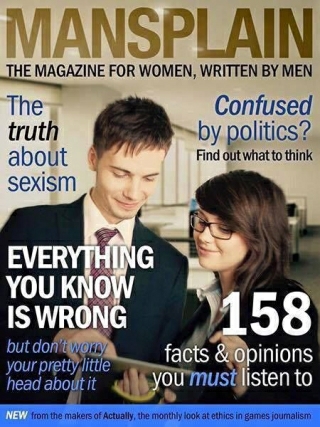 A Swedish trade union set up a temporary hotline for men and women to report instances of "mansplaining" on the job. Mansplaining was first described in 2008, and the term starting becoming popular around 2102. An Atlantic article describes its origins and offers a definition: "explaining without regard to the fact that the explainee knows more than the explainer, often done by a man to a woman."
A Swedish trade union set up a temporary hotline for men and women to report instances of "mansplaining" on the job. Mansplaining was first described in 2008, and the term starting becoming popular around 2102. An Atlantic article describes its origins and offers a definition: "explaining without regard to the fact that the explainee knows more than the explainer, often done by a man to a woman."
A spokesperson for the union described the rationale for the hotline:
Our objective is to contribute to awareness and start a discussion which we hope will be the first step in changing the way we treat each other and talk about each other in the workplace.
It's important to create awareness about how seemingly small things that we do or say add up to a larger issue.
Mansplaining may be a type of microaggression, a term used for subtle, yet damaging forms of discrimination. Microaggressions can be small acts and expressions that, taken alone may not constitute, for example, racism or sexism. But when people are subjected to similar acts or comments over time, it sure feels like racism or sexism.
Columbia Professor Derald Wing Sue has written extensively on the subject. He defines microaggressions as "brief and commonplace daily verbal, behavioral, or environmental indignities, whether intentional or unintentional, that communicate hostile, derogatory, or negative racial slights and insults toward people of color."
Discussion Starters:
- This post started about mansplaining and ended about microaggressions. Do you see the connection, or is this a stretch?
- Consider your own experience with mansplaining. Have you experienced it or done it? How has it affected you?
JPMorgan Found Guilty of Hiring Chinese Execs' Children
 JPMorgan Chase will pay settlements worth $264 million for hiring the children of Chinese executives in exchange for business. A three-year investigation found that the hires constitute bribery, and five more banks are under investigation.
JPMorgan Chase will pay settlements worth $264 million for hiring the children of Chinese executives in exchange for business. A three-year investigation found that the hires constitute bribery, and five more banks are under investigation.
An SEC press release describes the findings:
According to an SEC order issued today, investment bankers at JPMorgan's subsidiary in Asia created a client referral hiring program that bypassed the firm's normal hiring process and rewarded job candidates referred by client executives and influential government officials with well-paying, career-building JPMorgan employment. During a seven-year period, JPMorgan hired approximately 100 interns and full-time employees at the request of foreign government officials, enabling the firm to win or retain business resulting in more than $100 million in revenues to JPMorgan.
"JPMorgan engaged in a systematic bribery scheme by hiring children of government officials and other favored referrals who were typically unqualified for the positions on their own merit," said Andrew J. Ceresney, Director of the SEC Enforcement Division. "JPMorgan employees knew the firm was potentially violating the FCPA yet persisted with the improper hiring program because the business rewards and new deals were deemed too lucrative."
A company statement is nowhere to be found. The major news articles don't include a company quotation, and neither the Press Releases or News and Announcements sections of the JPMorgan website list a response.
According to a statement by the U.S. Department of Justice, the company has taken some internal action:
JPMorgan APAC also took significant employment action against six employees who participated in the misconduct resulting in their departure from the bank, and it disciplined an additional 23 employees who, although not involved in the misconduct, failed to effectively detect the misconduct or supervise those engaged in it.
Discussion Starters:
- How does this happen inside an organization? Consider who is involved in hiring decisions-sometimes a lot of people.
- Should JPMorgan make a statement about the settlement? Complete an audience analysis before you decide, and consider why the company leaders might choose to stay silent.
New Balance Responds to Neo-Nazi Controversy
 New Balance sneaker company has aligned with Trump's trade policies and is getting Neo-Nazi support it doesn't want. People responded by trashing their sneakers, and the company tweeted this statement.
New Balance sneaker company has aligned with Trump's trade policies and is getting Neo-Nazi support it doesn't want. People responded by trashing their sneakers, and the company tweeted this statement.
A GQ writer suggests, instead, that New Balance should be more direct:
Why not just say, "We do not want the endorsement of Neo-Nazis and if you are a Neo-Nazi please stop wearing our shoes." Is it really that hard to plain and simple condemn Neo-Nazis? This seems to be an attempt to not ostracize any customers or even, yes, Trump himself.
New Balance seems to be walking a line, trying not to lose customers on either side of aisle. The executive may very well be questioning whether he should have weighed in about the trade policy at all. Although CEOs should enter political debates carefully, New Balance has a lot at stake, according to a company statement:
As the only major company that still makes athletic shoes in the U.S., New Balance has a unique perspective on trade in that we want to make more shoes in the U.S., not less.
Discussion Starters:
- Should the executive have resisted commenting on Trump's trade policy? Why did New Balance enter the conversation?
- What's your view of the company's statement? Should it have been more direct, as the GQ writer suggests? What are the potential consequences?
Facebook's Fake News
Facebook has been displaying news according to users' preferences, which could override news that conflicts with their point of view. During the election, people saw fake stories that may have affected their vote. One frequent fake news writer bragged, "I think Trump is in the White House because of me. His followers don't fact-check anything - they'll post everything, believe anything."
BuzzFeed analyzed data from Facebook news stories and found that the top 20 fake election news stories outpaced shares, comments, and reaction to the top 20 legitimate election news stories. Although Mark Zuckerberg at first denied any connection between FB's fake stories and the election outcome, he later posted a plan for the social networking site to address fake news.
Zuckerberg posted, "[W]e don't want any hoaxes on Facebook." Still, he said, it's tough to distinguish fake news, and it's quite uncommon:
"Of all the content on Facebook, more than 99% of what people see is authentic. Only a very small amount is fake news and hoaxes. The hoaxes that do exist are not limited to one partisan view, or even to politics. Overall, this makes it extremely unlikely hoaxes changed the outcome of this election in one direction or the other."
This is a clever strategy, but the top 20 fake news stories got more than 8,711,000 shares, reactions, and comments, so it's not an insignificant number.
Melissa Zimdars, an assistant professor of communication and media at Merrimack College, compiled this list of ways to spot fake news.
In addition, a small group of students at a hackathon at Princeton University wrote FiB, which uses an algorithm to distinguish true and false news.
Discussion Starters:
- How do you assess news on Facebook or other social media sites?
- Have you ever posted something that you knew wasn't true? Why, and did you consider the potential consequences?
- Do you think fake news stories influenced the election? How?
Diageo Bans PowerPoint
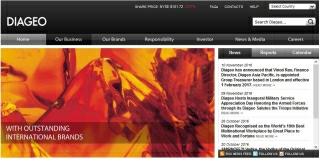 Diageo, an alcoholic beverages company, has banned PowerPoint presentations at some meetings. In an AdAge article, James Thompson, the company's North American chief marketing and innovation officer, describes his perspective:
Diageo, an alcoholic beverages company, has banned PowerPoint presentations at some meetings. In an AdAge article, James Thompson, the company's North American chief marketing and innovation officer, describes his perspective:
"It stops conversation. It makes people feel secure they've communicated what they wanted to. But, in fact, it doesn't move anything on," he said. So he has instituted a PowerPoint ban in some meetings. "Just talk to me, please" is his plea. His goal is to ensure his marketing team is "not totally buttoned-up all the time," he said. "We just want people to be at their best, and that is usually when they are able to think and respond and build rather than sell."
The change is part of other efforts, for example, hiring, to revive the company culture. Thompson said, "I've got nothing against MBA programs," but he is recruiting people from different sources instead of "where people came into the organization in a very conventional way and worked their way up in a very conventional way."
Discussion Starters:
- Do you agree with Diageo's decision? What are potential consequences of the decision?
- What could be some alternatives to a ban on PowerPoint?
- If you banned PowerPoint at some meetings, which type of meetings would you include?
- Consider different types of PowerPoints discussed in the text book. How are some outputs better for some audiences?
Marriott CEO's Letter to Trump

Marriott CEO Arne Sorenson is the latest company executive to write about the election results. In an open letter on LinkedIn, Sorenson offers some leadership advice.
The letter starts with Sorenson's views about government's role:
"The government has no business in our bedrooms – or our bathrooms. Everyone, no matter their sexual orientation or identity, has a right to live without interference in their private lives. Similarly, everyone, no matter their sexual orientation or identity, gender, race, religion disability or ethnicity should have an equal opportunity to get a job, start a business or be served by a business. Use your leadership to minimize divisiveness around these areas by letting people live their lives and by ensuring that they are treated equally in the public square."
Sorenson then focuses on three areas: "infrastructure, immigration reform and tax reform." As a hotel manager, Sorenson clearly is concerned about potential reductions in global travel and talent. He also encourages a more realistic approach for immigrants who are already in the U.S.
Discussion Starters:
- Why do you think Sorenson chose an open letter on LinkedIn as the medium for his message? What are some alternatives?
- What principles of persuasion, discussed in Chapter 7 of the book, does Sorenson use? Try to find examples of logos, pathos, and ethos.
- How does Sorenson's role as the CEO of Marriott influence his positions? Which of his suggestions would benefit hotel companies?
- Should Trump respond? If so, how, and what should he say?
Grubhub CEO: Agree or Resign?

The CEO of Grubhub had a tough message for employees who disagree with his anti-Trump sentiment: "you have no place here." After the election, Matt Maloney wrote an email about tolerance and inclusion. He expressed his disappointment in Trump's election, particularly his "demeaning, insulting and ridiculing minorities, immigrants and the physically/mentally disabled" and his "nationalist, anti-immigrant and hateful politics."
He went a step further at the end of the email:
"If you do not agree with this statement then please reply to this email with your resignation because you have no place here. We do not tolerate hateful attitudes on our team. I want to repeat what Hillary said this morning, that the new administration deserves our open minds and a chance to lead, but never stop believing that the fight for what's right is worth it."
Media reports and social media responses interpreted Maloney's message as a threat: anyone who voted for Trump should resign.
Maloney has responded that his email was misinterpreted:
"I want to clarify that I did not ask for anyone to resign if they voted for Trump. I would never make such a demand. To the contrary, the message of the email is that we do not tolerate discriminatory activity or hateful commentary in the workplace, and that we will stand up for our employees."
This distinction is important; otherwise, the company may be discriminating against people based on political views.
Discussion Starters:
- Read Maloney's full message to employees and his statement. How do you interpret his original message and the explanation?
- Should Maloney have sent the email to employees? What are the benefits and risks to the company and to him personally?
- Could Maloney have revised the email to avoid the controversy? How so?
Danny Meyer Encourages Employees to Listen
Restaurateur Danny Meyer wrote a post-election message to his employees, reflecting on the Trump win. It's a mixture of election-hangover, reconciliation, and encouragement. Like other business owners, Meyer is taking the opportunity to support his staff's communication, particularly listening to one another.
Dear USHG Colleagues,
It is a gray, damp morning in New York City and by the empty, downward looks on the faces of some of the same pedestrians I see almost every morning on the way to work, it seems that many did not sleep a whole lot last night. Other than the usual sirens and periodic honking car horns – my morning walk was far quieter and more self-reflective than usual. Like others, I am working hard to sort out my own feelings so that I can be there for my family and for you. I'm not going to sugar coat it: this is tough.
Before any of us can make sense of what will transpire in America following this election, let's acknowledge what we do know:
1) Democracy works. This campaign was hard fought, and Americans came out in droves to make their votes count. We will have a new, democratically elected president who prevailed in the Electoral College, and the results will be accepted, even if not appreciated by the slight majority of voters who voted elsewise. Do not underestimate how important and how unusual that is among the world's nations.
2) For those who feel completely shocked and disappointed by the election results (didn't all the polls tell us it would be otherwise?), note that the outcome itself mirrors the very theme of the entire election: that as a country we have done an inadequate job of listening to or hearing one another, and when enough people don't feel heard, massive change is inevitable. When will we learn that it is far more important for people to feel heard – even than to be agreed with? As a country and as a society which too often prizes shouting over respectful listening, we have clearly done a poor job at that.
3) Donald Trump will be our next president. I acknowledge that I found it hard to type those words, but there, I did it, and it was actually therapeutic. Acceptance of reality is never a bad first step to healing.
4) My dogs woke up today wagging their tails, wanting to be fed, and needing their morning walk. They slept perfectly well last night, and I believe they are fully prepared to accept the election results so long as they continue to be loved and cared for by the human beings they love: their family. I learned something from them this morning.
5) Other than feeling really tired and somewhat off kilter, I did my usual morning routine. I remembered to shave, managed to put on both socks and shoes, and got myself to work. I've already given five hugs today, and received five in return. They won't be the last.
6) We are an incredibly resilient country and company, and there is no way that the results of this election are going to erode our ability to pick ourselves up and to persevere. When faced with any type of adversity, we have always found ways to end up in a better place, and this time will be no different. I feel confident that we will all see the sun shining – even before the end of this week.
As I wrote to you the night before the election – even before knowing these results – we have both a responsibility and a powerful opportunity to lead with our strongest suit: hospitality. The root of the word hospitality is hope, and hope is optimistic. I need each one of you to remember this : that every single person who chooses to dine at one of our restaurants – or anywhere we serve food, is primarily paying us to deliver the four gifts we are capable of doing better and more consistently well than anyone else:
1. Eye Contact – let people know you see them!
2. Smile – let people know you are happy to see them!
3. Hug – let people know that in making them feel good, you feel good!
4. Good food – give them the pleasure they came for!
Give those gifts with abandon, and we will show one another, and our guests why we are champions. It always works.
Enlightened Hospitality works and over the course of our company's history, whenever we have been tested by challenges, whenever our world has been rocked, and times are uncertain – we have turned to what we know and do best: first taking care of ourselves, so that we can do a remarkable job at taking care of others. I'm holding myself accountable to that, and need you to do the same. And that begins with listening.
I am aware that many in our community may have woken up this morning feeling just as elated by the election results as others are feeling deflated. I honor that, and want to learn from every single point of view. What a privilege we have to be a company that provides tables at which people can break bread, communicate their feelings, be heard, and advance what is best about being human!
Writing this has given me the opportunity to express myself to you, and if you've read this far, you've given me the gift of being heard. I hope you will examine your own feelings, and feel safe expressing yourself to your colleagues, and give them the gift of doing the same.
It is eminently clear to me that people who feel, express, listen, hear, and love is who we are, and what we must do for one another, and for our guests.
I promise to do that to my utmost for you.
Danny
Danny Meyer | CEO
Union Square Hospitality Group
www.ushgnyc.com
Restaurants are in the news after the election. Nation's Restaurant News summarizes, from a policy perspective, how Trump's presidency may affect the industry. And a New York Times article today, "Owner Was Target, but Restaurant Workers Are Swept Up in Immigration Raids titled," may justify concerns about immigration.
Discussion Starters:
- What are Danny Meyer's main points to his employees? How do you think employees could receive it? Consider people on both sides of the aisle.
- Read the Nation's Restaurant News article. How would you summarize the potential impacts of Trump's presidency on the industry? Restaurant owners seem to be mixed about whether it's good or bad news.
NY Times Promises Fair Coverage
The New York Times publisher and executive editor sent an unusual email to subscribers about election coverage. Poynter reports that this email and another to employees were in response to criticism of left-leaning coverage of the campaign.
The message is both reflective and forward-looking, questioning an unprecedented election and assuring readers fair coverage of President Trump in the future. The publisher and editor promise to stay true to the newspaper's core mission, and they thank loyal customers.
Arthur Sulzberger is the newest member of the family to be named publisher of The Times. A fifth-generation publisher, Sulzberger is a descendant of Adolph S. Ochs, who bought the paper in 1896.
The email comes after Sulzberger sent an internal memo to staff:
Dear Colleagues,
As we close one of the most momentous weeks in our nation's recent history, let's pause for a moment on those famous instructions that Adolph S. Ochs left for us: to cover the news without fear or favor.
As Donald Trump begins preparing for his new administration, those words have rarely felt more important.
The Times is certainly not afraid - our investigative report has demonstrated our courage many times over. That fearless, hard-fought journalism will always stand as the backbone of The Times, no matter the President.
But we also approach the incoming Trump administration without bias. We will cover his policies and his agenda fairly. We will bring expert analysis and thoughtful commentary to the changes we see in government, and to their ramifications on the ground.
We will look within and beyond Washington to explore the roots of the anger that has roiled red and blue America. If many Americans no longer seem to understand each other, let's make it our job to interpret and explain.
Our predecessors founded our singular newspaper for just this moment - to serve as a watchdog to the powerful; and to hold mighty institutions accountable, without fear or favor. We are more than ready to fulfill that promise.
Together, we have built the world's best digital newsroom and it, too, was made for just this moment. We will chronicle the new administration with a lightning-fast report that features stories told in every medium and on every platform.
Here is what we have all dedicated our careers to: Going after the biggest stories in the world, and telling them as ambitiously as possible.
Get some rest this weekend. We have lots to do.
Arthur
Discussion Starters:
- You might read this as either an admission or a defense. What's your view?
- What are the communication objectives of both emails? You might consider the newspaper business today. To what extent do you think they meet those objectives? Overall, are the messages effective?
- Assess the writing style against principles in Chapter 5. Pay particular attention to word choice and sentence structure.
Wells Fargo's New Commercial
Wells Fargo is trying to rebuild its image after facing the scandal that it opened accounts for people who didn't request them and weren't aware they had them. Until now, we heard little from the company, except an email to some customers and a full-page ad with plans that seemed quite basic.
A new, short commercial focuses on three points: fully refunding those impacted, proactively sending new account confirmations, and eliminating product sales goals.
These actions are a bit more specific than what has been communicated in the past. However, a skeptic like me might say these steps are still the bare minimum that the company can do for customers. Also eliminating product sales goals, which arguably caused the trouble because they were overly aggressive, should have been done years ago, particularly now that we know employees had reported issues but were ignored or retaliated against.
Discussion Starters:
- Assess this commercial. Who are the primary and secondary audiences? What are the communication objectives? How well does the company achieve them?
- Consider the language choices. The three actions aren't quite parallel. What other changes could be made?
- What else should Wells Fargo do at this point to rebuild its image?
Managers Encourage Unity at Work
 Last week, we read about increasing divisions at work because of the contentious presidential election. Now that the election is over, companies are trying to unite workers who may have been on opposite sides.
Last week, we read about increasing divisions at work because of the contentious presidential election. Now that the election is over, companies are trying to unite workers who may have been on opposite sides.
Starbucks CEO Howard Schultz had emailed employees before the election:
Many Americans have allowed the vitriolic nature of the presidential campaign to ignite our differences and strip away our civility and dignity. In the process, we've lost faith in what we all know has always been true, the promise of America.
But you are the true promise of America.
…
Kindness, compassion, empathy, and yes love is what we need. It is what we must display and share. We are all longing for a deeper sense of human connection and humanity because, when we are touched by it, it fills us up.
Now, several companies are trying strategies, such as videos and chat sessions, to help employees move on from the high emotions during the campaign season.
The news isn't all bad at work. In a commercial real estate firm, The Wall Street Journal reports, managers believe difficult conversations have offered a type of "team building in this weird sort of way."
Discussion Starters:
- What has been your experience post-election at work and at school? How are people managing differences?
- If you were to write an email to foster unity among students at your school, what would you say?
Acceptance and Concession Speeches
After a surprise Donald Trump presidential victory, the future president and Secretary Clinton gave their respective speeches. Both candidates were respectful to the other, with Trump complimenting Clinton on a hard-fought campaign, and Clinton encouraging people to support Trump as our new president.
Clinton's concession speech asked people to give Trump a chance to lead. She said she hoped he would be "a successful president for all Americans."
Discussion Starters:
- To introduce Trump's speech, future Vice President Mike Pence said, "This is a historic night." It is: this is the first U.S. president who has had neither military nor government experience. Besides Trump's background, what else makes this election victory "historic"?
- Assess Trump and Clinton's delivery skills. Understandably, they are both tired! What other observations do you have?
- Both Trump and Clinton were, shall we say, political in their comments. Which parts are least believable?
FBI Says Nothing New in Clinton Emails
Just under the wire-two days before a close election-the FBI has announced nothing worthy of attention, after all, in Hillary Clinton's emails. The news comes just eight days after the FBI, led by James Comey, said the organization discovered new emails during an investigation of Anthony Weiner. At the time, no charges were made, and the FBI said they had no information about the emails, which wasn't helpful just 10 days before the national election.
Some question whether the FBI could reasonably read all messages, but it seems that most emails were personal or duplicates of what the FBI already reviewed.
In his letter to Congress, Comey stressed the work of the FBI agents to review the messages and said their conclusion from July was unchanged: no charges will be made in relation to Clinton's email server.
The news made The New York Times' biggest online front page headline as well as The Wall Street Journals'.
Discussion Starters:
- Once again, did Comey do the right thing? What kind of pressure do you think he's been under?
- How, if at all, do you think this latest news will affect the election results? The first announcement did seem to tighten Clinton's lead. Will this announcement reverse it?
- Why are people influenced by this news-either way? The candidates have starkly different approaches, backgrounds, and plans.
Christie Associates Found Guilty
Two former associates of NJ Governor Chris Christie were found guilty of causing traffic problems for political gain. In what has been called "Bridgegate," Bridget Anne Kelly and Bill Baroni conspired to close lanes on the George Washington Bridge in 2013 as retaliation against the mayor of Fort Lee. At the time, Kelly was Christie's deputy chief of staff, and Baroni was the deputy director of Port Authority. Previously, two other aides admitted guilt in relation to the scandal.
The most incriminating piece of evidence was an email exchange between Kelly and David Wildstein, who leaked the plan. The message is clear: "Time for some traffic problems in Fort Lee."
In a statement released after the verdicts, Christie says he's "saddened," but he continues to maintain his innocence.
Christie reiterated this point during an interview with CBS News.
But the verdict is bad news for Christie-and possibly for Donald Trump. On the stand during her trial, Kelly said that Christie knew about the plan, and text messages from another aide said he "flat out lied." Trump had named Christie to lead a transition team should he become president, and Christie is actively campaigning for Trump in these last days before the election.
Discussion Starters:
- Does this verdict hurt Christie's chance of maintaining his innocence? Why or why not?
- Assess his statement to the press. How effectively does he stay clear of the case and verdicts?
- What, if anything, should Trump do at this point? He didn't choose Christie as his vice presidential running mate, but he's clearly a Christie fan.
Election Causes Emotions to Run High at Work
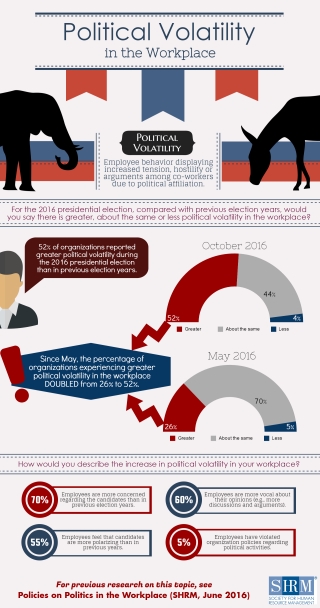 A Society for Human Resources (SHRM) survey found more "political volatility" at work than in previous election years. The rate is up from another SHRM survey conducted in June. Respondents said that employees are more concerned this year about the candidates and more vocal about their opinions.
A Society for Human Resources (SHRM) survey found more "political volatility" at work than in previous election years. The rate is up from another SHRM survey conducted in June. Respondents said that employees are more concerned this year about the candidates and more vocal about their opinions.
This infographic summarizes the survey responses.
Politics are part of life, and perhaps this is just part of "bringing your whole self to work," which we discuss in Chapter 2 of the tenth edition. Or should we avoid talking about politics in the workplace?
Although these conversations may be uncomfortable, a Harvard Business Review article quotes Joseph Grenny, coauthor of Crucial Conversations:
"[Y]ou spend the majority of your waking hours with your colleagues, and so it's natural to "feel the need to process your thoughts and feelings" with them. In fact, he says, learning how to talk about politics in a productive manner can help you "manage other difficult conversations at work," including peer performance reviews or disagreements over strategy and policy. Politics is just another topic where "emotions run strong, the stakes are high, and opinions vary," he says.
The article suggests strategies for managing political discussions at work, for example, viewing them as an opportunity to learn more about each other, focusing on the process instead of a candidate, and knowing when to "disengage."
Discussion Starters:
- What's your view? Should we avoid talking about politics at work, or is it an opportunity for building a better team?
- Have you been in an awkward or frustrating situation with a coworker about a political situation? How did you handle it, and what did you learn?
- What do you think will happen after this year's election? Will we all go back to normal, or is that just wishful thinking?
Verizon's 2016 Fact Sheet
In addition to annual reports, many companies publish fact sheets-shorter, friendlier versions for financial and other company information. In Verizon's recent Fact Sheet, the company puts its message clearly up front: A clear purpose. A new identity. Verizon mentions the recent AOL acquisition, but it's too soon to include the bid for Yahoo. 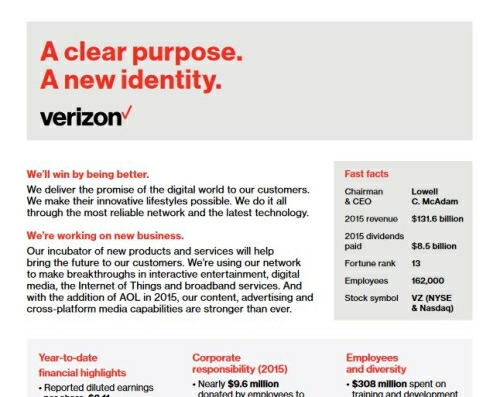
The company is clearly proud of its girth: big numbers are listed throughout the two pages. However, we have little context for the data. For example, $308 million was spent on training and development. Who benefited, and how was that money shared throughout the organization? Did senior managers attend executive MBA programs? Or was it spent on basic skills required for the company instead of developing more transferable skills? How does that compare to training investment at similar firms, etc.?
Discussion Starters:
- Looking at the Fact Sheet, what other questions do you have about the data?
- Graphically, the two pages are very simple. Why do you think Verizon made this choice? What are the alternatives? Research other companies to explore other designs.
Student's Blog Post Gets Attention
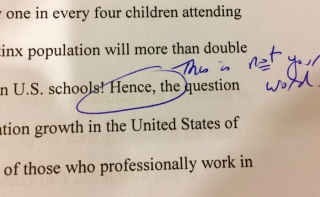 Suffolk University student Tiffany C. Martinez was accused of plagiarism, and she wrote a blog post that's gone viral. According to Martinez, her professor returned a paper to her in front of the classroom and said, "This is not your language." She then reviewed her comments.
Suffolk University student Tiffany C. Martinez was accused of plagiarism, and she wrote a blog post that's gone viral. According to Martinez, her professor returned a paper to her in front of the classroom and said, "This is not your language." She then reviewed her comments.
"Hence" was one example circled in the paper, and Martinez said her professor wrote on the paper, "Please go back and indicate where you cut and paste."
In a blog post titled, "Academic, Love Me Back," Martinez explained what happened and the impact on her. Here is an excerpt:
At eight o'clock this morning, I felt both disrespected and invalidated. For years I have spent ample time dissecting the internalized racism that causes me to doubt myself, my abilities, and my aspirations. As a student in an institution extremely populated with high-income white counterparts, I have felt the bitter taste of not belonging. It took until I used my cloud of doubt and my sociological training to realize that my insecurities are rooted in the systems I navigate every day. I am just as capable if not more so than those around me and my accomplishments are earned.
The acting president and provost wrote a letter to the university community, promising an investigation.
Discussion Starters:
- Read more of Martinez's account in her blog post. How would you describe her point of view?
- What's your view of the university's letter to the community?
- What response do you think the professor may have? How, if at all, can he or she explain her actions?
Does Comey Regret His Decision?
 FBI Director James B. Comey made headlines today for reporting new allegations against Hillary Clinton because of, you guessed it, her use of email. This time, new emails have been discovered in connection with Anthony Weiner, the former NY congressman who was caught "sexting." His ex-wife is Huma Abedin, a Clinton aide.
FBI Director James B. Comey made headlines today for reporting new allegations against Hillary Clinton because of, you guessed it, her use of email. This time, new emails have been discovered in connection with Anthony Weiner, the former NY congressman who was caught "sexting." His ex-wife is Huma Abedin, a Clinton aide.
Comey apparently went public with the news, in the form of a letter to Congress, without any specifics, with no decision to bring charges, and despite warnings from the Department of Justice. Soon after Comey went public, he issued this email to FBI employees, perhaps indicating his ambivalence about the release.
To all:
This morning I sent a letter to Congress in connection with the Secretary Clinton email investigation. Yesterday, the investigative team briefed me on their recommendation with respect to seeking access to emails that have recently been found in an unrelated case. Because those emails appear to be pertinent to our investigation, I agreed that we should take appropriate steps to obtain and review them.
Of course, we don't ordinarily tell Congress about ongoing investigations, but here I feel an obligation to do so given that I testified repeatedly in recent months that our investigation was completed. I also think it would be misleading to the American people were we not to supplement the record. At the same time, however, given that we don't know the significance of this newly discovered collection of emails, I don't want to create a misleading impression. In trying to strike that balance, in a brief letter and in the middle of an election season, there is significant risk of being misunderstood, but I wanted you to hear directly from me about it.
Jim
Clinton's approach to the news is to go on the attack, criticizing Comey's decision as "unprecedented" and "deeply troubling."
Discussion Starters:
- Did Comey make the right decision? Why or why not? Is this just a distraction from the election, which is just 10 days away, or is this essential to Americans' decision?
- Will Hillary ever live down this issue? If she becomes president, what is the best way for her to handle the situation?
Layoffs at Twitter
Twitter is laying off about 9% of employees and closing Vine, the short video app it purchased in October 2012 before it launched. When Instagram offered video options, Vine immediately lost much of its user base. About 350 employees are affected.
Layoffs are awkward for Twitter, a site sometimes used for "live tweeting" bad news. In this case, a former employee created a Twitter Moment, "Last Day at Twitter." Exiting employees also used the hashtag #TwitterLayoffs. This could be risky for a company, but the posts are positive. It could be that employees enjoyed their time at Twitter and understand the rationale for layoffs. It could also be that employees are in high demand from other companies, so they won't be out of work too long.
Discussion Starters:
- Why do you think employees tweeted nice messages on their last day? I offered two theories. Any other ideas?
- Should the company have created its own hashtag for the event to pre-empt something worse? Why or why not?








